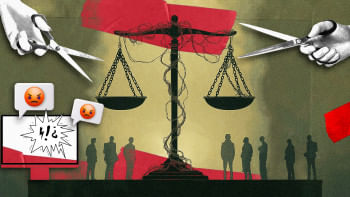What we can learn from Robin Khuda

Amid the chaos and turmoil that dominate headlines worldwide, here is a story that lifts the spirit and rekindles a sense of hope. It is a tale of generosity, shared success, and the kind of leadership that inspires not just employees but humanity as a whole.
Robin Khuda, founder, and CEO of AirTrunk, a data centre company based in Australia, has recently made global headlines for an extraordinary act of largesse. AirTrunk, a company just nine years old, is on the brink of completing a $24 billion acquisition deal with a major American private equity firm. But instead of quietly celebrating his financial success, Khuda decided to share the company's triumph with those who made it possible: his employees. He announced a $22 million bonus payout to his 330 employees, each receiving an impressive $65,000.
As if that were not enough, this comes on top of an existing profit-sharing agreement for 120 senior staff members. This act of generosity stands as a testament to Khuda's leadership and his recognition of the collective effort behind AirTrunk's success. His message to his staff was simple yet profound, "We would not have achieved what we have without you."
For those of us who are of Bangladeshi origin, Khuda's story stirs a deep sense of pride. Born in Bangladesh, Khuda moved to Australia at the age of 18 and began his journey from humble beginnings. Witnessing someone from our homeland rise to such heights and then give back so generously touches a very human chord, which some might label as "tribal DNA" that connects us to our shared heritage.
What makes Khuda's actions truly extraordinary is not just the magnitude of his generosity, but its rarity in a world where corporate profits often remain tightly guarded by shareholders and top executives. His approach represents a stark contrast to the more familiar stories of greed and exploitation that have marred capitalism's image.
In reflecting on this, one cannot help but wonder: what if more leaders followed Khuda's example? While capitalism has decisively outlasted communism as an economic framework in the ideological battles of the past century, its flaws have become increasingly evident. Even China, governed by a communist party, has adopted some of the world's most rampant capitalistic practices. However, the promise of the "free market" often obscures the reality of structural inequalities, monopolistic practices, and environmental degradation. Without proper regulation, capitalism's tendency to exacerbate income inequality threatens the very stability it seeks to establish.
Khuda's actions show a potential way forward—a form of capitalism that reimagines the relationship between employers and employees as a partnership rather than a hierarchy. By sharing success, companies can foster loyalty, inspire innovation, and address some of the disparities that fuel global discontent. His story exemplifies how capitalism's sharpest edges can be softened to create not just wealth but shared prosperity.
As we reflect on Khuda's story, let us consider its broader implications. It is not simply about one man's generosity—it is a call to rethink systems to restructure a more equitable and sustainable world. In these turbulent times, stories like this remind us of what is possible when leadership is guided by both vision and humanity.
Dr Mushfiqur Rahman is a retired telecommunication specialist based in Melbourne, Australia.
Views expressed in this article are the author's own.
Follow The Daily Star Opinion on Facebook for the latest opinions, commentaries, and analyses by experts and professionals. To contribute your article or letter to The Daily Star Opinion, see our submission guidelines.

 For all latest news, follow The Daily Star's Google News channel.
For all latest news, follow The Daily Star's Google News channel. 









Comments